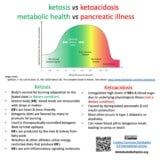Might keto therapies help fight Alzheimer’s Disease?

Major Risk Factors for Alzheimer’s Disease
Studies show that major risk factors for Alzheimer’s include metabolic, lifestyle and genetic factors:
- Diabetes (1, 4, 7)
- Obesity (1)
- Cardiovascular disease (1,4)
- Lack of exercise (1, 7)
- Poor sleep (2, 3, 5)
- Depression (6, 7) and
- The ApoE4 genetic allele (4)
- Combination of the above factors (8)
Problems with brain glucose usage related to Alzheimer’s
One significant alteration experienced by Alzheimer’s disease patients is brain glucose dysregulation. This dysregulation correlates with plaques/tangles in the brain as well as the clinical symptoms of the disease. (9) At one point, we thought that the brain, unlike the rest of the body, didn’t need insulin to utilize glucose. But, recent research over the past decade has debunked this myth. Insulin resistance may be part of the disease-related energy dysregulation seen in Alzheimer’s disease.
Alzheimer’s as type 3 diabetes
A review of evidence put it well:
“We conclude that the term ‘type 3 diabetes’ accurately reflects the fact that AD represents a form of diabetes that selectively involves the brain and has molecular and biochemical features that overlap with both type 1 diabetes mellitus and T2DM.” [type 2 diabetes]
In type 3 diabetes the brain itself becomes insulin resistant. (10)
A doctor’s personal story – a dementia diet?
Dr. Newport chronicled the treatment of her husband, Steve in her book Alzheimer’s Disease: What if There Was a Cure?: The Story of Ketones (2011 and 2013). Steve had early-onset Alzheimer’s Disease in his late 50’s. He had the ApoE4 allele, which is a risk factor for Alzheimer’s disease. She was a medical doctor practicing neonatal medicine who sought to slow, if not reverse, the progression of her husband’s Alzheimer’s. Dr. Newport started supplementing him with medium-chain triglyceride (MCT) oil and coconut oil. Other than adding these oils she kept his baseline diet constant.
After 2.5 months, his mini-mental status exam score (a standard measure of cognitive functioning) reportedly improved from 12 to 20. Although this is a significant improvement, note that a normal score is 27-30. So while Steve had improved, he still had cognitive impairment. The progression of his Alzheimer’s may have slowed, but it was not reversed.
After 2 years on this treatment, an MRI showed no further brain atrophy. He maintained his cognitive improvement. Dr. Newport then added a ketone ester supplement, and she reported that he had even more improvement. This intervention attempts to mimic the benefits of the ketogenic diet therapies by providing exogenous ketones. If he were on a ketogenic diet then his body would produce its own ketones. Steve’s reported improvement was not quantified. Because no measurement was made, we can not know its magnitude.
Unfortunately, Steve fell and sustained a head injury. He began having seizures as a result. Ultimately he died at age 65 (2016). In the end, ketones were reported to have improved some of Steve’s symptoms but they did not cure Alzheimer’s disease.
Patients with mild Alzheimer’s benefit cognitively from ketones
In a 2009 study, 152 mild Alzheimer’s Disease (AD) patients were treated with a ketogenic agent (AC-1202) or given a placebo. The ketogenic treatment group demonstrated cognitive improvement. These effects were most notable in those without the APOE4 allele. Remember, Steve had the APOE4 allele and improved, but only mildly. This improvement was found even though 80% of the patients in both groups were already on one form of Alzheimer’s therapy. As a result, the authors concluded:
“Chronic induction of ketosis may offer a novel strategy for AD that can be used with current therapies.” (11)
Ketosis enhances memory in mild cognitive impairment
Another study was conducted with 23 older adults with Mild Cognitive Impairment (MCI). They were randomly assigned to either a low-carb or high-carb diet. Those in the low-carb group had memory improvement compared to the high-carb group. The level of ketosis in the low-carbers correlated with their memory improvement. But calories consumed, insulin levels, or weight loss did not. It seems that the ketosis was the variable that produced the improvement in this small study.
The authors concluded:
“These findings indicate that very low carbohydrate consumption, even in the short-term, can improve memory function in older adults with increased risk for Alzheimer’s disease. While this effect may be attributable in part to the correction of hyperinsulinemia, other mechanisms associated with ketosis such as reduced inflammation and enhanced energy metabolism also may have contributed to improved neurocognitive function. Further investigation of this intervention is warranted to evaluate its preventive potential and mechanisms of action in the context of early neurodegeneration.” (12)
Studies of a ketogenic diet in mice
A 2005 study looked at the impact of the ketogenic diet in a mouse model of Alzheimer’s Disease over a 43 day period. Mice ate one of two diets. Either a 4:1 (4 grams fat for every 1 gram combined protein and carbohydrate) ketogenic diet or a standard diet of high carbohydrate/low-fat mouse chow. Mice that ate the ketogenic diet lost weight and produced ketones. The keto diet mice also reduced their Amyloid-Beta 40 and 42, which reduced by 25%. Despite this reduction, researchers noted no behavioral improvements. (13) Again mixed results, a physiological improvement, without a behavioral one in this mouse study. [Note that Amyloid-Beta 40 and 42 are the most important abnormal proteins suspected of driving disease in Alzheimer’s affected brains. (14)]
A second mouse study (Ma 2018) demonstrated improvement in vascular and blood-brain barrier function with the ketogenic diet. The authors concluded:
“Our findings suggest that KD intervention started in the early stage may enhance brain vascular function, increase beneficial gut microbiota, improve metabolic profile, and reduce the risk for AD.” [Alzheimer’s Disease] (15)
Small randomized clinical trial in humans
Meanwhile, researchers at Johns Hopkins have conducted a trial using a ketogenic diet for Alzheimer’s. In April of 2019, they reported the results for this small randomized clinical trial. They used the ketogenic diet with 9 people who had mild cognitive impairment or Alzheimer’s disease. The authors conclude:
“Our preliminary data suggest that the generation of even trace ketones might enhance episodic memory and patient-reported vitality in very early AD.”
Implications – diet and Alzheimer’s
At this point, there is no cure for Alzheimer’s disease. It is a chronic, progressive neurological disorder. Alzheimer’s is associated with neuronal atrophy and nerve cell death. Once dead, neurons don’t come back to life, no matter the attempted intervention, including the ketogenic diet. Thus, it is likely that there is a point at which it is too late to intervene to help Alzheimer’s disease patients. But, early or preventative intervention with the ketogenic diet may be helpful. Study evidence validating the ketogenic diet’s potential therapeutic effectiveness is accumulating.
For now, prevention is the key. Can the ketogenic diet or ketone supplements prevent Alzheimer’s disease? At this point, we don’t have enough evidence to be able to say they will. However, the first-level data from these early associational studies provide tantalizing clues. More research is clearly needed. In the meantime, we know that exercise, good sleep, maintaining a healthy weight, and controlling diabetes are all things that we can do to help ward off Alzheimer’s disease.
Books on Alzheimer’s and ketosis
- The Alzheimer’s Antidote: Using a Low-Carb, High-Fat Diet to Fight Alzheimer’s Disease, Memory Loss, and Cognitive Decline by Amy Berger. She can be found at Tuit Nutrition.
- The End of Alzheimer’s: The First Program to Prevent and Reverse Cognitive Decline by Dale Bredesen.
More recent research
A Rationale for Ketogenic Therapies in Neuro-Degenerative Disorders – Amy Berger’s presentation at Low Carb USA’s Virtual San Diego conference was a great review of recent literature in this emerging field.
Related topics which you might find interesting
Learn more about the relationship between the ketogenic diet and other treatment-resistant mental disorders
- Doris’s chronic schizophrenia put into remission bringing hope to many
- Relieving depression with the ketogenic diet?
Other resource guides & toolkits you might value
Curious about improving metabolic health with lifestyle?
- Lifestyle Medicine, the key to metabolic healing
- What is metabolic health? A layperson’s definition and a biochemist’s perspective
Where do I start improving my metabolic health?
- Your patient toolkit for prediabetes & type 2 diabetes
- What to eat? Get clever! Clinicians’ flexible approach to tailoring carb reduction to you.
- Want more detail on carbohydrate reduction? A round-up of quality, what-to-eat guides from around the web
- Best resources for an overview of keto – Metabolic Multiplier’s round up of the best resources we’ve found by evidence-based organizations & clinicians. For patients, families & caregivers.
- Keto doctors near me – over 20 directories of low-carb professionals
For clinicians using therapeutic carbohydrate reduction (TCR), ketogenic diet therapies (KDT)
- Best Keto resources for clinicians & other practitioners
- How to build my ketogenic therapy treatment team – Support for the more complex cases.
- Why write medical case reports about unique cases? – Our round up can save you time.
For colleagues interested in amplifying metabolic health
- Overview schematics help us think about metabolic health – Understand our Organizing Research team‘s thinking behind these 3 metabolic health research portals
- Communication guide to unite advocacy for metabolic health – Suggested language metabolic health advocacy. Principles. Language to use or avoid. Food & lifestyle first.
- Style Guide to unite advocacy for metabolic health – Welcome new team members! Many of you encourage using one voice for metabolic health. Below are suggestions from your fellow clinicians, scientists and professionals. See our Communication Guide as well. We’d love to hear…
- What Foundations support Metabolic Health? Charities, advocacy & grassroots groups using metabolic interventions & health to treat metabolic conditions.
Sources:
This article is based on Chris Palmer, MD‘s presentation at Low Carb USA’s West Palm Beach January 2019 conference. Thanks to Keto Mojo‘s generosity you can view it for free here. At the time using keto-for-psych was a nascent idea. We thank him for his thought leadership and scholarship! My thanks for Nurse Christie‘s medical review and extensive edits.
Major risk factors for Alzheimer’s
- Onyango, I. G., Dennis, J., & Khan, S. M. (2016). Mitochondrial Dysfunction in Alzheimer’s Disease and the Rationale for Bioenergetics Based Therapies. Aging and disease, 7(2), 201–214. doi:10.14336/AD.2015.1007
- Macedo AC1, Balouch S2, Tabet N2. Is Sleep Disruption a Risk Factor for Alzheimer’s Disease? Journal of Alzheimer’s Disease.2017;58(4):993-1002. doi: 10.3233/JAD-161287.
- Pistollato F, Sumalla Cano S, Elio I, Masias Vergara M, Giampieri F, Battino M. Associations between Sleep, Cortisol Regulation, and Diet: Possible Implications for the Risk of Alzheimer Disease. Advances in Nutrition. 2016 Jul 15;7(4):679-89. doi: 10.3945/an.115.011775. Print 2016 Jul.
- Hickman RA, Faustin A, Wisniewski T. Alzheimer Disease and Its Growing Epidemic: Risk Factors, Biomarkers, and the Urgent Need for Therapeutics. Neurologic Clinics. 2016 Nov;34(4):941-953. doi: 10.1016/j.ncl.2016.06.009. Epub 2016 Aug 4.
- Spira AP1, Chen-Edinboro LP, Wu MN, Yaffe K. Impact of sleep on the risk of cognitive decline and dementia. Current Opinion in Psychiatry. 2014 Nov;27(6):478-83. doi: 10.1097/YCO.0000000000000106.
- Xia M, Yang L, Sun G, Qi S, Li B. Mechanism of depression as a risk factor in the development of Alzheimer’s disease: the function of AQP4 and the glymphatic system. Psychopharmacology (Berl). 2017 Feb;234(3):365-379. doi: 10.1007/s00213-016-4473-9. Epub 2016 Nov 12.
- Barnes DE, Yaffe K. The projected effect of risk factor reduction on Alzheimer’s disease prevalence. Lancet Neurology. 2011 Sep;10(9):819-28. doi: 10.1016/S1474-4422(11)70072-2. Epub 2011 Jul 19.
- Tao P Yang SN Tung YC, Yang MC. Development of Alzheimer disease in old major depressive patients based upon their health status: A retrospective study in Taiwan. Medicine (Baltimore). 2019 May; 98(20):e15527. doi: 10.1097/MD.0000000000015527.
Brain glucose regulation and type 3 diabetes
9. An Y, Varma VR, Varma S, Casanova R, Dammer E, Pletnikova O, Chia CW, Egan JM, Ferrucci L, Troncoso J, Levey AI, Lah J, Seyfried NT, Legido-Quigley C, O’Brien R, Thambisetty M. Evidence for brain glucose dysregulation in Alzheimer’s disease. Alzheimers Dementia. 2018 Mar;14(3):318-329. doi: 10.1016/j.jalz.2017.09.011. Epub 2017 Oct 19.
10. de la Monte, S. M., & Wands, J. R. (). Alzheimer’s disease is type 3 diabetes-evidence reviewed. Journal of diabetes science and technology,2(6), 1101–1113. doi:10.1177/193229680800200619
Exogenous ketones & dietary ketosis
11. Henderson, S. T., Vogel, J. L., Barr, L. J., Garvin, F., Jones, J. J., & Costantini, L. C. (2009). Study of the ketogenic agent AC-1202 in mild to moderate Alzheimer’s disease: a randomized, double-blind, placebo-controlled, multicenter trial. Nutrition & metabolism, 6, 31. doi:10.1186/1743-7075-6-31
12. Krikorian, R., Shidler, M. D., Dangelo, K., Couch, S. C., Benoit, S. C., & Clegg, D. J. (2012). Dietary ketosis enhances memory in mild cognitive impairment. Neurobiology of aging, 33(2), 425.e19–425.e4.25E27. doi:10.1016/j.neurobiolaging.2010.10.006
Mice studies
13. Van der Auwera, I., Wera, S., Van Leuven, F., & Henderson, S. T. (2005). A ketogenic diet reduces amyloid beta 40 and 42 in a mouse model of Alzheimer’s disease. Nutrition & metabolism, 2, 28. doi:10.1186/1743-7075-2-28
14. Qiu T, Liu Q, Chen YX, Zhao YF, Li YM. Aβ42 and Aβ40: similarities and differences. Journal of Peptide Science. 2015 Jul;21(7):522-9. doi: 10.1002/psc.2789. Epub 2015 May 28.
15. Ma D, Wang AC, Parikh I, Green SJ, Hoffman JD, Chlipala G, Murphy MP, Sokola BS, Bauer B, Hartz AMS, Lin AL. Ketogenic diet enhances neurovascular function with altered gut microbiome in young healthy mice. Sci Rep. 2018 Apr 27;8(1):6670. doi: 10.1038/s41598-018-25190-5.
Small clinical trial
16. Brandt J, Buchholz A, Henry-Barron B, Vizthum D, Avramopoulos D, Cervenka, M C. Preliminary Report on the Feasibility and Efficacy of the Modified Atkins Diet for Treatment of Mild Cognitive Impairment and Early Alzheimer’s Disease. Journal of Alzheimer’s Disease. vol. 68, no. 3, pp. 969-981, 08 April 2019. DOI: 10.3233/JAD-180995.











2 Responses
[…] Alzheimer’s & Keto Diet […]
[…] Alzheimer’s & Keto Diet […]